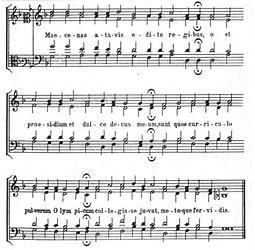Early Modern Period#
Paul Hofhaimer: Maecenas atavis#
Paul Hofhaimer (1459 Radstadt - 1537 Salzburg) was not only the most important organist of his day. His composed Odes represent the artistic climax of this kind of composition. Unlike the two main Ode authors, Konrad Celtis and Peter Tritonius, who used a given cantus firmus in the tenor which became the basis for the soprano, bass and a (superfluous) alto, Hofhaimer composed his own canti firmi. He wrote the bass as the voice of the teacher who provided the fundament for the upper voices, which were sung by the students. This pedagogical structure guaranteed a long life for the Humanistenode (Humanist Ode) since they became a popular means of teaching music in the Latin shools. The musical example and notation demonstrate the Ode Maecenas atavis in Systema Asclepiadeum primum. (E. Stadler)
Sound Clip#
© Les Menstrels, Mirror Music, Wien
